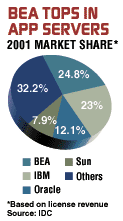Sun, BEA, IBM To Heat Up App Server Market
Sun is taking a particularly aggressive stance. On the heels of its inclusion of the Sun Open Net Environment (ONE) Application Server 7, Platform Edition, in the new Solaris 9 Operating Environment (OE), a source close to Sun said last week that Sun plans to slash pricing for the Sun ONE Application Server 7, Enterprise Edition, slated for release in June.
In addition, Sun is in the process of more closely linking the pricing of its software portfolio to its hardware products in the way that IBM typically does, according to the source.

Sun executives said that they intend to include in the stand-alone version the clustering technology Sun acquired early this year from Clustra Systems to boost app server performance.
Sun's efforts are an attempt to gain market share against IBM and BEA, said Shawn Willett, principal analyst at Current Analysis.
The latest 2001 numbers from research firm IDC have Sun fourth in the app server space, with 7.9 percent market share, behind BEA, IBM and Oracle.
IDC analyst Michele Rosen said the dominant players in the Java app server market clearly identified themselves in 2001. This year they will be under pressure to compete on more than just strong J2EE implementation, she said.
"The number of players competing in the market shrank during 2001," Rosen said. "All of the vendors still standing have to prove their value proposition in 2002 based on something other than core J2EE functionality."
BEA, which unveiled its WebLogic Server 7 at its eWorld developer show in February, plans to make the product available in June. IBM also is expected
sometime this summer to release its WebSphere Application Server 5, which the company introduced at its recent developerWorks Live show.
Even Microsoft, which has been somewhat quiet as the battle for app server turf heats up among IBM, BEA and Sun, is entering the fray. The company is taking the position that Microsoft Windows 2000 is an application server with directory services built in, and it will become stronger with the Windows.Net Server release later this year.
Last week, Microsoft executives said that the Windows operating system is evolving beyond basic networking and collaboration features such as
file and print services to become a core application server for traditional client/server applications, as well as XML Web services.
IDC's Rosen said that while Microsoft's position is viable, it shouldn't have an effect on J2EE vendors. Companies that already run on a Windows network likely will use .Net, she said.
Rosen added that she doesn't expect much migration from a Java environment to Microsoft or vice versa, since such a migration process bears too high a price tag in the current economic environment.
Rob Mock, president of Lansing, Mich.-based solution provider Dewpoint, suggested that competition in the application server market is moot, since directory services are becoming the foundation of the network.
That evolution, he said, bodes well for a company such as Sun, which has positioned its Sun ONE Directory as a network- identity product alongside its app server. Sun also has built Sun ONE Directory into Solaris 9 OE.
"He who owns the app server does not own the account," said Mock. "He who owns the directory owns the account. Wrapping the app server with identity management is key for Sun."
Bob Lytle, vice president of technology at Dewpoint, said customers are moving toward buying a complete software platform,including application server, portal server and integration software,from one vendor, rather than stand-alone products from different vendors.
"In reality, people are making a vendor choice and sticking with it," said Lytle. "Nowadays, people will centralize a corporate strategy on one stack."
PAULA ROONEY contributed to this story.